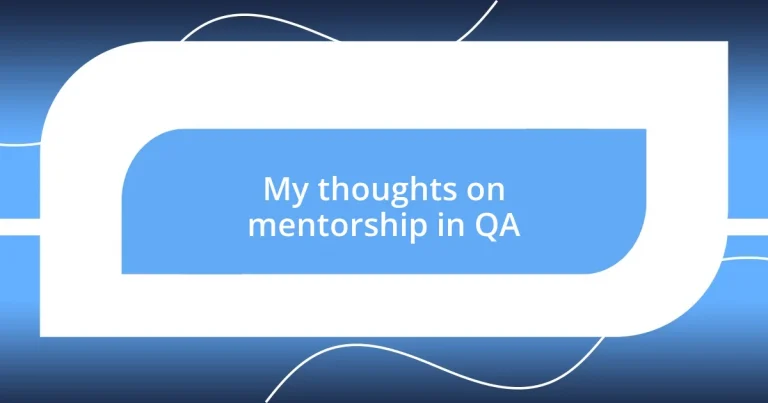Key takeaways:
- Mentorship in QA significantly enhances professional growth by providing personalized guidance, boosting confidence, and fostering a culture of collaboration within teams.
- Key qualities of effective mentors include empathy, adaptability, and strong communication skills, which create a supportive learning environment and facilitate understanding.
- Setting and regularly evaluating mentorship goals is crucial for a productive relationship, allowing for alignment and adaptability to meet changing aspirations and challenges.
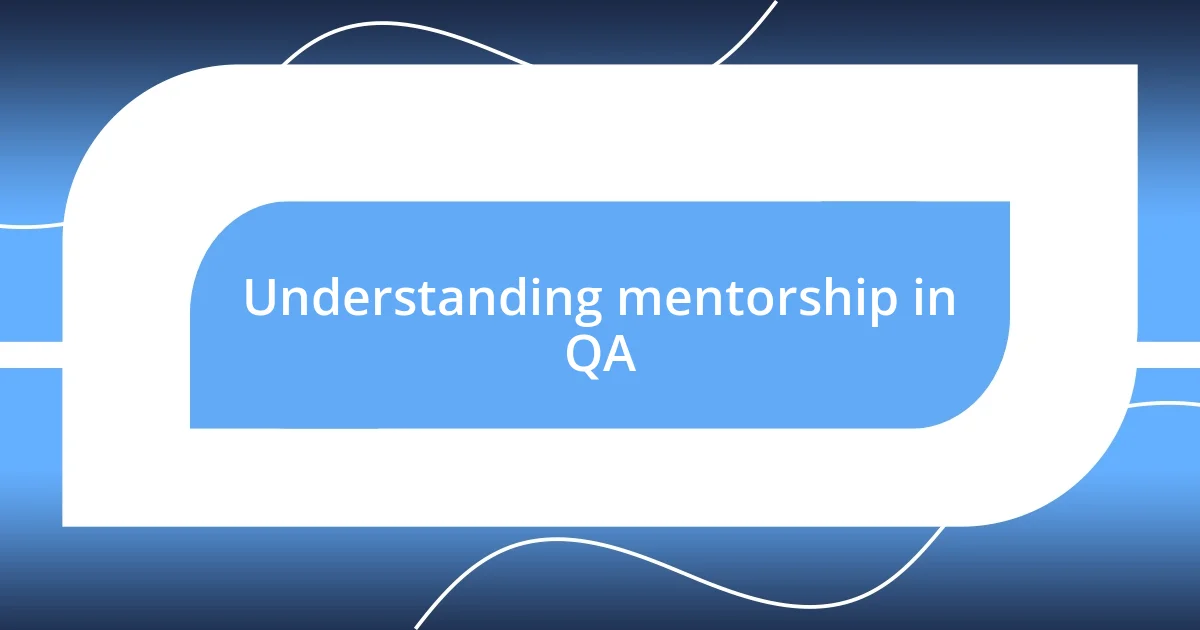
Understanding mentorship in QA
Mentorship in Quality Assurance (QA) is a transformative experience that can significantly shape a professional’s career trajectory. I still remember my first mentor, who took the time to patiently explain the intricacies of testing methodologies, making what seemed daunting much more approachable. Isn’t it fascinating how guidance from someone more experienced can illuminate pathways we hadn’t even considered?
The relationship between a mentor and mentee goes beyond technical skills; it’s about fostering confidence and navigating challenges together. I can recall moments when my mentor didn’t just correct my mistakes, but shared their own experiences—flaws, mishaps, and all—to help me see that no one is perfect. This mutual sharing creates an emotional connection that enriches the learning experience. Have you ever felt the weight lift off your shoulders when someone simply acknowledges that they, too, struggled at first?
Additionally, mentorship in QA promotes a culture of learning and collaboration that benefits the entire team. I’ve seen how having mentors in a workplace not only accelerates individual growth but also enhances team dynamics. When everyone feels supported, isn’t it easier to share ideas and innovate? The essence of mentorship lies in that dual purpose: developing the individual while simultaneously strengthening the team as a whole.
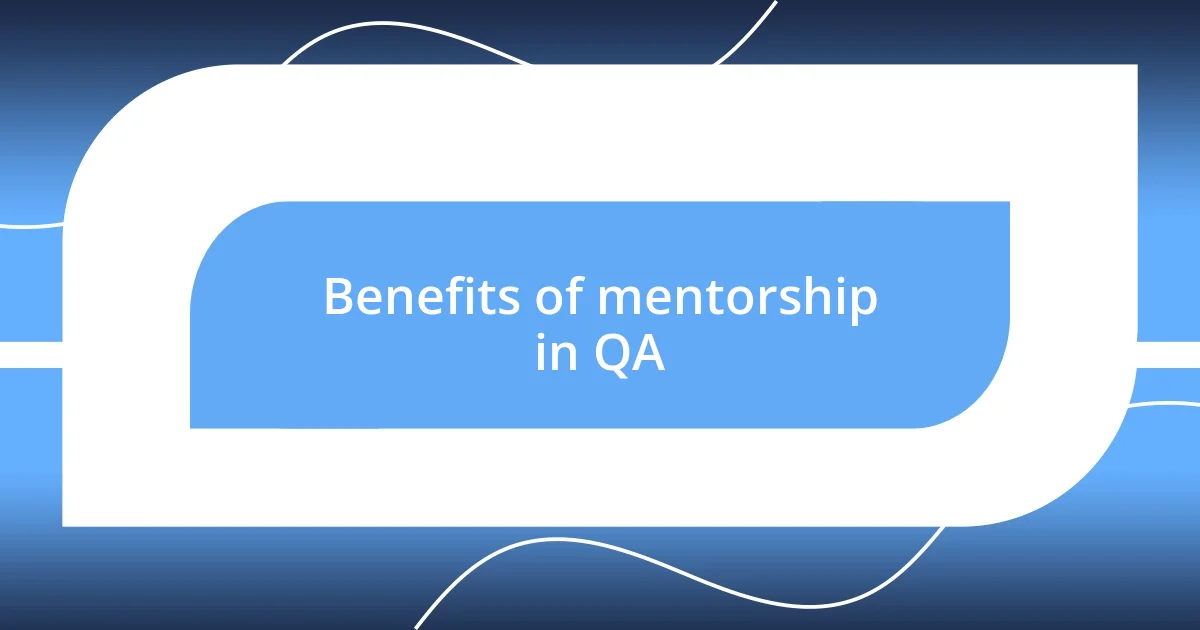
Benefits of mentorship in QA
The benefits of mentorship in QA are profound and multifaceted. Personally, I’ve noticed that having a mentor not only enhances my technical expertise but also boosts my confidence. In those early days, I had moments where I doubted my ability to deliver quality work. A mentor’s encouragement changed all that; they helped me recognize my strengths and guided me through setbacks, turning what could have been discouraging experiences into valuable learning opportunities.
Here are some key benefits I’ve observed:
- Skill Development: Mentorship provides personalized guidance tailored to your specific needs, allowing you to enhance your testing skills more effectively.
- Networking Opportunities: Mentors often introduce you to valuable contacts in the industry, opening doors that may not have been accessible otherwise.
- Increased Confidence: With a mentor’s support, you gain the assurance needed to take on challenging projects and responsibilities.
- Knowledge Sharing: Learning from your mentor’s experiences—both successes and failures—can help you avoid common pitfalls.
- Career Growth: A mentor can provide insight into career progression, helping you set and achieve professional goals that align with your aspirations.
Reflecting on my journey, I can’t help but appreciate the way mentorship has cultivated a supportive environment in QA. Just like that time my mentor sat down with me to analyze a particularly tricky bug—it wasn’t just about solving the issue but the deeper understanding we built together during that discussion. Transformative moments like these instill a sense of purpose and belonging that career milestones often can’t match.
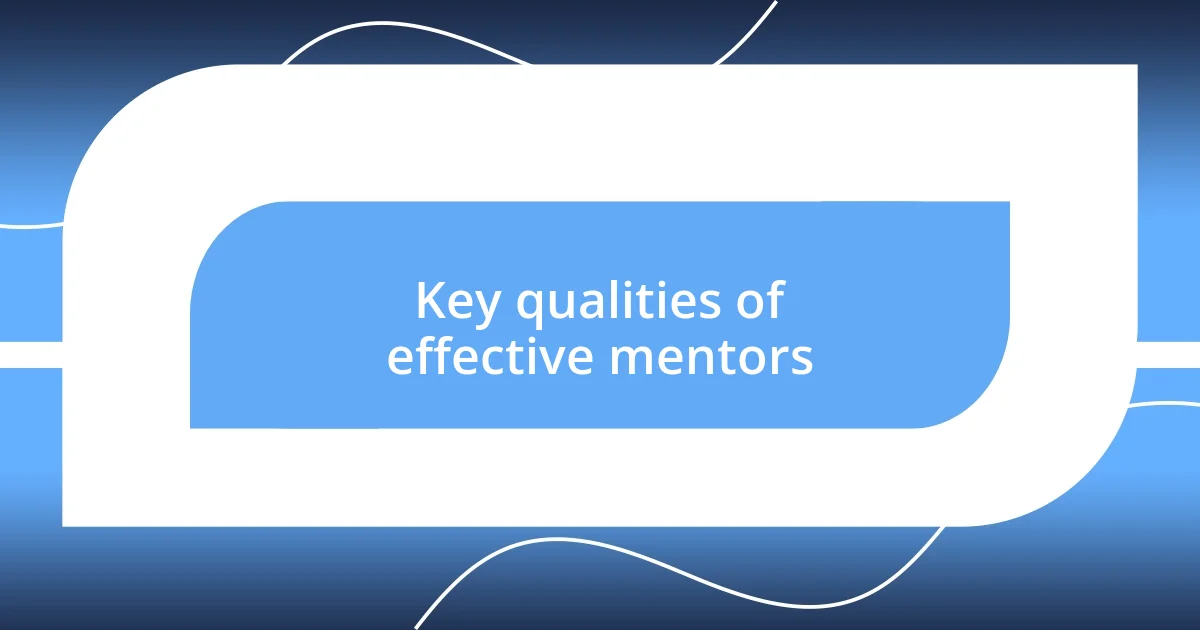
Key qualities of effective mentors
When it comes to effective mentorship, a few key qualities stand out. Empathy is paramount; understanding where a mentee is coming from can make all the difference in their learning journey. I recall a time when my mentor sensed my frustration during a challenging assignment. Instead of simply offering solutions, they listened and acknowledged my feelings, which made me feel valued and understood. Have you ever had someone genuinely listen to you? It’s transformative.
Moreover, adaptability is essential in a mentor-mentee relationship. Every individual learns differently, and a great mentor can tailor their approach accordingly. I remember when I struggled with automated testing. Instead of sticking to their usual teaching methods, my mentor shifted gears and incorporated hands-on practice, which was immensely helpful. It taught me that being flexible can lead to breakthroughs in understanding complex concepts. Isn’t it fascinating how adjusting one’s methods can unlock a whole new level of insight?
Lastly, effective mentors should possess strong communication skills. The ability to convey ideas clearly is key to guiding a mentee. I often reflect on how my mentor broke down intricate processes into digestible steps. Their straightforward explanations were like breadcrumbs leading me through a complicated forest of QA practices. That clarity not only helped me grasp the concepts but also encouraged me to express my own thoughts freely. It’s remarkable how communication can bridge gaps in knowledge.
| Key Quality | Description |
|---|---|
| Empathy | Understanding the emotional state and background of the mentee, making them feel valued and acknowledged. |
| Adaptability | Tailoring teaching methods to fit the unique learning styles of each mentee. |
| Communication Skills | Clearly conveying information, allowing for easier understanding and encouraging open dialogue. |
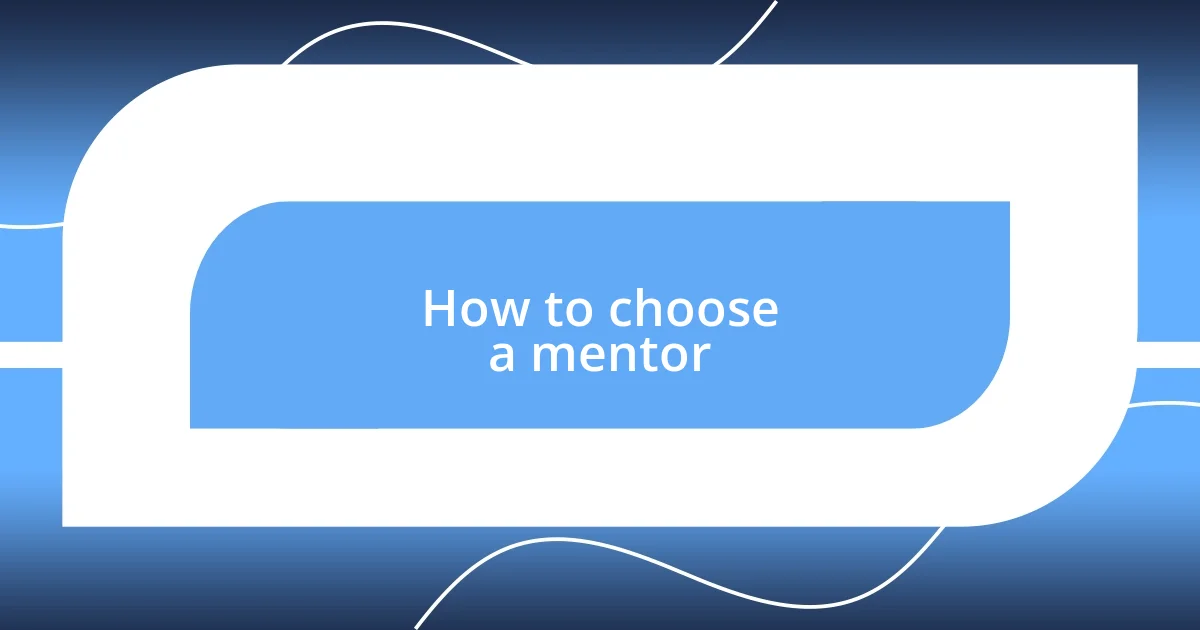
How to choose a mentor
Choosing the right mentor can feel like navigating a maze, but I believe there are a few guiding principles that can help you find your way. First, consider the mentor’s background and expertise in areas you wish to grow. I once connected with a mentor who specialized in performance testing, and that focus enriched my skill set significantly. Ask yourself: Does their experience align with your goals? It’s crucial that you feel inspired by their journey.
Another aspect to consider is their style of communication and approach. I remember approaching a potential mentor who was known for their straightforward demeanor. Initially, I hesitated, thinking their style might not mesh with my more sensitive nature. However, once we started working together, I realized that their directness helped me address issues head-on and grow thicker skin. Can you relate? Sometimes our first impression may prevent us from recognizing the true value a mentor can offer.
Lastly, trust your gut feeling about how comfortable you feel with a potential mentor. I’ve interacted with individuals who seemed impressive on paper but didn’t resonate with me personally. That instinct matters—mentorship is often a deeply personal connection. When I finally found a mentor whose values mirrored mine, it felt like finding a missing puzzle piece, making learning more enjoyable and effective. Does that spark any thoughts on your own experiences of mentorship?
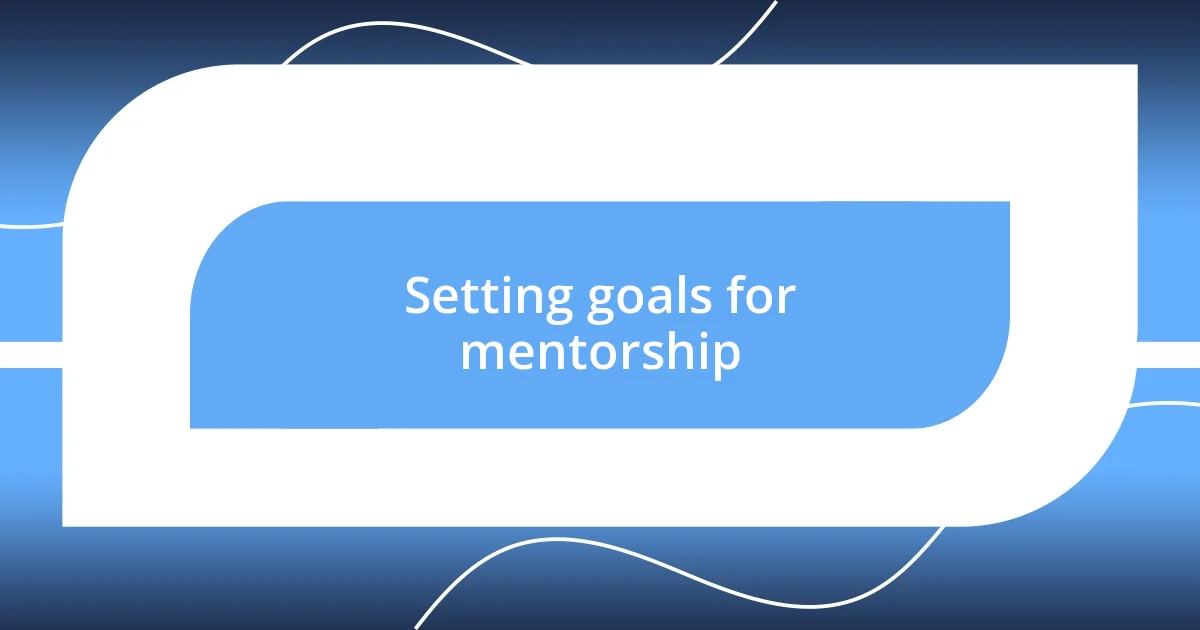
Setting goals for mentorship
Setting goals for mentorship is crucial for establishing a productive relationship. I often found that having clear objectives not only guided our sessions but also provided a sense of direction for my learning process. For instance, during one of my mentorship experiences, we set a target to master a specific testing tool in three months. That shared goal made our meetings more structured and focused.
When thinking about mentorship goals, think about both short-term and long-term aspirations. I’ve seen how short-term goals, like completing a particular project or learning a new technique, can lead to quick wins that boost confidence. In contrast, long-term goals, such as developing leadership skills, encouraged me to adopt a growth mindset. Balancing both types can create a rich tapestry of progress—can you see how each goal contributes to a larger picture?
Reflecting on my journeys, it’s important to revisit and adjust goals regularly. Life and work can change rapidly, sometimes leading you in unexpected directions. I remember a time when I started exploring a different field within QA, which prompted my mentor and me to pivot our goals. This adaptability was pivotal in ensuring that our mentorship remained relevant and meaningful. How often do you check in with your own goals—are they still aligned with where you want to go?
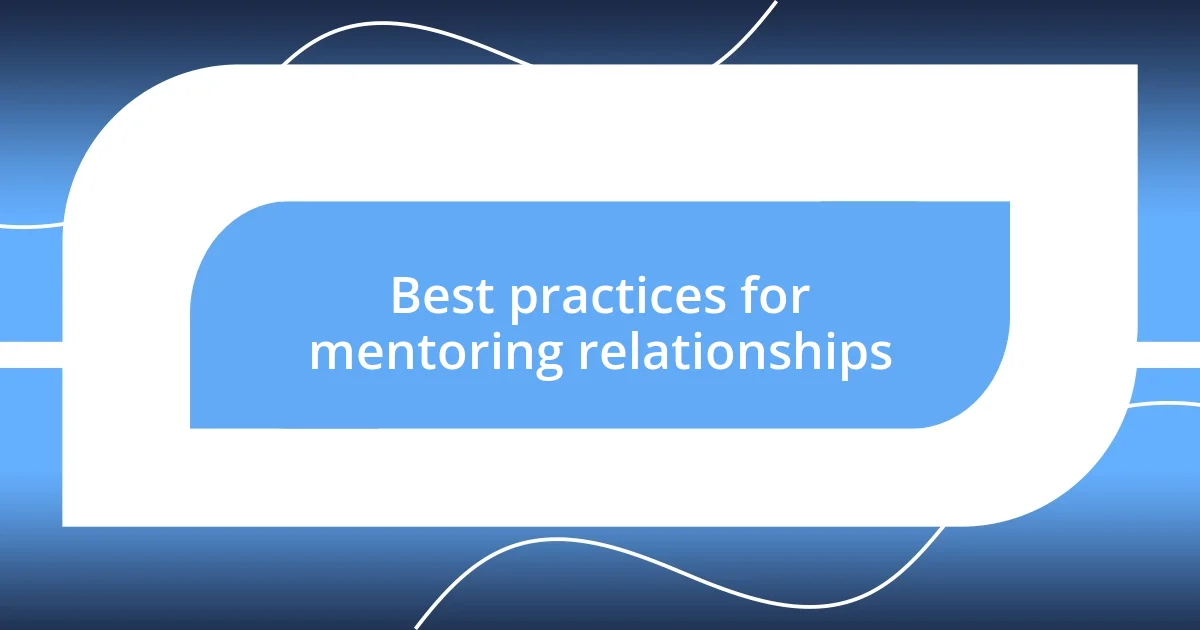
Best practices for mentoring relationships
Building strong mentoring relationships hinges on open and honest communication. I recall a time when I was paired with a mentor who initiated check-in calls, understanding that sharing feedback in real-time could foster greater growth. This proactive communication style not only cleared up misunderstandings but also created a space where I felt comfortable expressing my challenges and triumphs. Have you ever had a mentor who made the effort to communicate regularly? That consistent touchpoint can be transformative.
Another best practice is to cultivate mutual respect and reciprocity in the relationship. I learned this through a mentor who encouraged me to share my own insights and experiences, creating a two-way street. It became evident that value flows in both directions; I contributed fresh perspectives while learning from their wisdom. This dynamic not only enriched my understanding but also deepened our connection. Have you considered how your unique experiences might add value to your mentoring relationship?
It’s essential to celebrate successes, no matter how small. I used to underestimate minor achievements until my mentor pointed out how each step brought me closer to my goals. We dedicated time in our sessions to acknowledge these victories, which turned our meetings into positive, uplifting experiences. Creating a ritual to recognize progress can invigorate the mentoring relationship and remind both parties of how far they’ve come. How often do you take a moment to celebrate your own achievements in your journey?
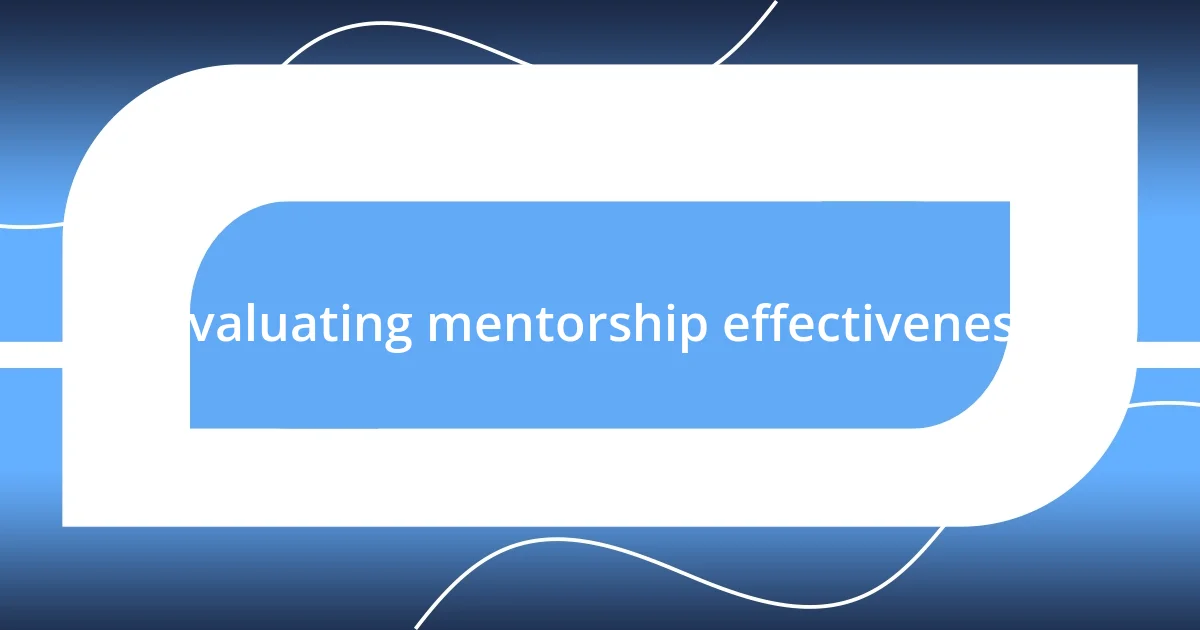
Evaluating mentorship effectiveness
Evaluating the effectiveness of mentorship is essential to ensure the relationship is yielding desired outcomes. From my experience, I found that regular check-ins with my mentor helped gauge our progress. We would often reflect on what was working and what needed adjustment, which kept us aligned on our goals.
One method I implemented was creating feedback loops after completing significant tasks or learning new concepts. I vividly remember presenting a project to my mentor, and the ensuing discussion helped me see not just where I excelled, but also areas for improvement. It was enlightening to hear their perspective, which illuminated aspects I hadn’t considered before—have you ever received feedback that shifted your view entirely?
Additionally, I think it’s important to assess not just the professional growth, but also the personal connection developed over time. I once had a mentor who supported me through a challenging phase at work; that emotional backing was invaluable. Reflecting on such moments made me realize that mentorship effectiveness isn’t solely about skills—it’s about feeling empowered and understood. How do you measure the emotional impact of your mentorship experiences?











